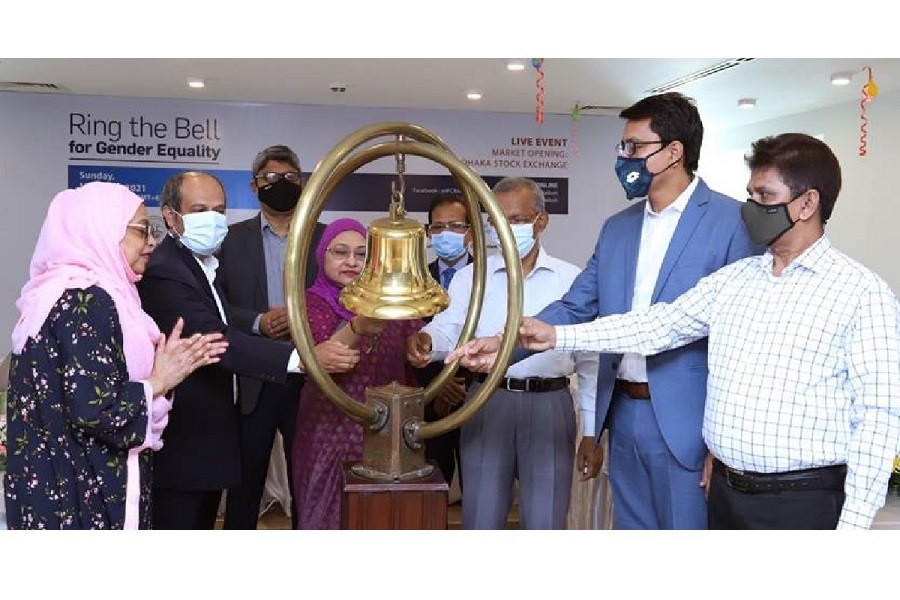Just one in 20 of the women, who currently make up 18 per cent of directors on the boards of listed companies in Bangladesh, are independent directors.
In terms of women on boards of listed companies, Bangladesh tops the South Asia region with a higher average than the global average of 17 per cent.
This was found in a study, jointly conducted by International Finance Corporation (IFC) and Dhaka Stock Exchange (DSE). The 2020 IFC-DSE study report was released on the occasion of the celebration of International Women's Day.
Celebrating International Women's Day, the private sector arm of the World Bank Group partnered with the DSE, UN Women, and United Nations Global Compact for the sixth consecutive year to 'Ring the Bell for Gender Equality.'
While emphasising women's role in shaping a more equal future, the annual event highlights the link between gender equality, sustainability, and inclusive growth, reports UNB citing a press release.
This year's event comes at a critical moment, as the economic and social consequences of COVID-19 continue to disproportionately impact women.
Research shows that women have borne the brunt of added household burdens and have lost their jobs at about 1.8 times the rate of men.
Studies also show that female talent is among the least utilised economic and business resources around the world, and the pandemic is worsening the situation.
Making even small inroads in closing the global gender gap could quickly yield strong results, with the potential to increase global gross domestic product by $12 trillion by 2025, according to a report of the McKinsey Global Institute.
"We are extremely pleased that the DSE-along with over 100 other stock exchanges around the world-joined hands with IFC and other partners to Ring the Bell for Gender Equality," said Shibli Rubayat-Ul- Islam, Chairman, Bangladesh Securities and Exchange Commission.
"We remain fully committed to closing the gender gap and promoting women's role in leadership, particularly in listed companies in Bangladesh. This will help private sector companies create value and promote inclusive growth," he added.
"Women have to work twice as hard to succeed in a male-dominated world of work, and at the same time, women carry a significantly larger part of the unpaid domestic care burden. This care burden and other gendered access barriers have been amplified by COVID-19," said Mia Seppo, United Nations Resident Coordinator in Bangladesh.
"Despite this, we see plenty of evidence of women's resilience, innovation and leadership. In a future, gender equal world, there is no limit to how far women can go."
In Bangladesh, IFC has been working with multiple stakeholders including the stock exchange, regulators, and companies to promote the adoption of good corporate governance practices and standards.
Recently, IFC also initiated an integrated Environmental, Social and Governance (ESG) project that aims to encourage good ESG practices, create sustainable markets, and promote gender-diverse firms in the country.
"There has never been a better time to work on economic gender parity," said Lopa Rahman, Corporate Governance Officer, IFC.
"The COVID-19 pandemic has created an opportunity to pursue more focused, value-creating strategies such as gender-smart investing to help private sector companies sustain economies and protect jobs."
Globally, IFC is working with the private sector and international development partners to prevent gender gaps accentuated by the pandemic from widening, including committing $8.0 billion to sustain businesses and preserve jobs and $4.0 billion for a global health platform.
IFC is also providing guidance to companies on equitable crisis response and recovery, and prioritizing gender balance in its own investments. Women currently represent 49 per cent of IFC nominee directors on client company boards, ahead of reaching the corporate target of 50 per cent in 2030.
The 2021 'Ring the Bell for Gender Equality' event marks the seventh year of a global partnership between IFC, The World Federation of Exchanges, Sustainable Stock Exchanges (SSE) Initiative, United Nations Global Compact, UN Women, and Women in ETFs.


